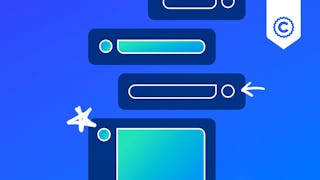Prêt à explorer le monde passionnant de l'IA générative et des grands modèles de langage (LLM) ? Ce cours IBM, qui fait partie du certificat professionnel Generative IA Engineering Essentials with LLMs, vous permet d'acquérir des compétences pratiques pour exploiter l'IA afin de transformer les industries.

Profitez d'une croissance illimitée avec un an de Coursera Plus pour 199 $ (régulièrement 399 $). Économisez maintenant.

IA générative et LLMs : Architecture et préparation des données
Ce cours fait partie de plusieurs programmes.


Instructeurs : Joseph Santarcangelo
40 709 déjà inscrits
Inclus avec
(369 avis)
Expérience recommandée
Ce que vous apprendrez
Faire la différence entre les architectures et les modèles IA génératifs, tels que les RNN, les transformateurs, les VAE, les GAN et les modèles de diffusion
Décrire comment les serveurs d'authentification, tels que GPT, BERT, BART et T5, sont appliqués dans les tâches de traitement du langage naturel
Mettre en œuvre la tokenisation pour prétraiter le texte brut à l'aide de bibliothèques NLP comme NLTK, spaCy, BertTokenizer et XLNetTokenizer
Créer un chargeur de données NLP dans PyTorch qui gère la tokenisation, la numérisation et le padding pour les ensembles de données textuelles
Compétences que vous acquerrez
- Catégorie : Visage étreint
- Catégorie : Traitement du langage naturel (NLP)
- Catégorie : Réseaux neuronaux récurrents (RNN)
- Catégorie : IA générative
- Catégorie : Prétraitement de données
- Catégorie : Intelligence artificielle
- Catégorie : Grand modèle de langage (LLM)
- Catégorie : Réseaux adversoriels génératifs (GAN)
- Catégorie : Pipelines de données
- Catégorie : PyTorch (Bibliothèque d'Apprentissage automatique)
- Catégorie : Architectures de modèles génératifs
Détails à connaître

Ajouter à votre profil LinkedIn
4 devoirs
Découvrez comment les employés des entreprises prestigieuses maîtrisent des compétences recherchées

Élaborez votre expertise du sujet
- Apprenez de nouveaux concepts auprès d'experts du secteur
- Acquérez une compréhension de base d'un sujet ou d'un outil
- Développez des compétences professionnelles avec des projets pratiques
- Obtenez un certificat professionnel partageable

Il y a 2 modules dans ce cours
Dans ce module, vous découvrirez l'importance de l'IA générative et la façon dont elle transforme divers domaines par la génération de contenu, la création de codes et la synthèse d'images. Vous explorerez les architectures clés de l'IA générative, telles que les réseaux antagonistes génératifs (GAN), les autoencodeurs variationnels (VAE), les modèles de diffusion et les transformateurs, et comprendrez les différences dans leurs approches de formation. Vous examinerez également comment les grands modèles de langage (LLM) tels que les transformateurs génératifs pré-entraînés (GPT) et les représentations d'encodeurs bidirectionnels à partir de transformateurs (BERT) sont appliqués dans la construction d'applications basées sur le NLP. Enfin, grâce à un laboratoire pratique, vous créerez un simple chatbot en utilisant la bibliothèque de transformateurs Hugging Face et vous serez initié aux outils et bibliothèques essentiels utilisés dans le développement de l'IA générative.
Inclus
5 vidéos2 lectures2 devoirs1 élément d'application3 plugins
Dans ce module, vous apprendrez à préparer les données pour l'entraînement de grands modèles de langage (LLM) en mettant en œuvre la symbolisation et en construisant des chargeurs de données. Vous explorerez différentes méthodes de tokenisation et comprendrez comment les tokenizers convertissent le texte brut en entrée prête pour le modèle. Vous mettrez en œuvre la tokenisation à l'aide de bibliothèques telles que NLTK, spaCy, BertTokenizer et XLNetTokenizer. En outre, vous apprendrez le rôle des chargeurs de données dans le pipeline d'entraînement et utiliserez la classe DataLoader dans PyTorch pour créer un chargeur de données avec une fonction collate personnalisée qui traite des lots de texte. Ces compétences pratiques sont essentielles pour construire des pipelines NLP efficaces pour la formation LLM. En outre, des documents de soutien, tels qu'une antisèche et un glossaire, renforceront votre apprentissage.
Inclus
2 vidéos5 lectures2 devoirs2 éléments d'application2 plugins
Obtenez un certificat professionnel
Ajoutez ce titre à votre profil LinkedIn, à votre curriculum vitae ou à votre CV. Partagez-le sur les médias sociaux et dans votre évaluation des performances.
Instructeurs

Offert par
En savoir plus sur Apprentissage automatique
 Statut : Essai gratuit
Statut : Essai gratuit Statut : Essai gratuit
Statut : Essai gratuit Statut : Essai gratuit
Statut : Essai gratuit Statut : Essai gratuit
Statut : Essai gratuit
Pour quelles raisons les étudiants sur Coursera nous choisissent-ils pour leur carrière ?




Avis des étudiants
369 avis
- 5 stars
76,40 %
- 4 stars
15,81 %
- 3 stars
5,36 %
- 2 stars
1,34 %
- 1 star
1,07 %
Affichage de 3 sur 369
Révisé le 29 juil. 2025
I would expect more hands on and code submissions
Révisé le 24 mars 2025
Too fast reading of the slides without much of explanations.
Révisé le 11 nov. 2025
Labs could have been made a little more lucid and comprehensive with comments for unusual syntaxes and appropriate visuals for the subject matter. Great course, regardless.

Ouvrez de nouvelles portes avec Coursera Plus
Accès illimité à 10,000+ cours de niveau international, projets pratiques et programmes de certification prêts à l'emploi - tous inclus dans votre abonnement.
Faites progresser votre carrière avec un diplôme en ligne
Obtenez un diplôme auprès d’universités de renommée mondiale - 100 % en ligne
Rejoignez plus de 3 400 entreprises mondiales qui ont choisi Coursera pour les affaires
Améliorez les compétences de vos employés pour exceller dans l’économie numérique
Foire Aux Questions
Il ne vous faudra que deux semaines pour terminer ce cours si vous consacrez deux heures d'étude par semaine.
Il sera bon que vous ayez une connaissance de base de Python et PyTorch et une familiarité avec l'apprentissage automatique et les concepts de réseaux neurones.
Ce cours fait partie d'une spécialisation. Lorsque vous terminerez la spécialisation, vous vous préparerez avec les compétences et la confiance nécessaires pour occuper des postes tels que ingénieur IA, ingénieur NLP, ingénieur en apprentissage automatique, ingénieur en apprentissage profond et scientifique des données.
Plus de questions
Aide financière disponible,

